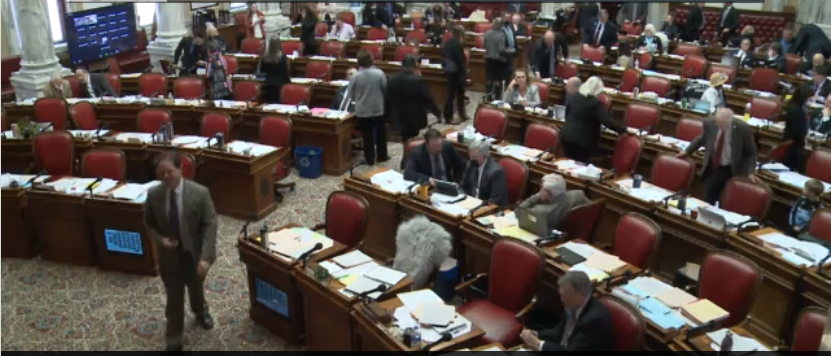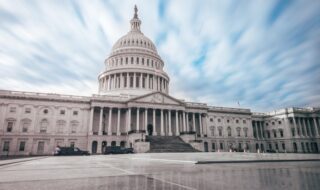January 15, 2023
UI Theft and Penalties Bill Passes House
State Director Ronda Wiggers reports from Helena on the legislative and political week ending January 13.
UI Theft, Retail Theft, and Computer Crimes- House Bill 142, a revision of laws related to unemployment insurance theft and penalties was heard January 13. This bill closes a small loophole where people falsely claimed UI benefits, but did not do so in sworn statement, but with a fraudulent invoice. This bill passed the House this week and is headed to the Senate.
- The House Judiciary Committe heard House Bill 161, which would generally revise computer crimes. This bill adds substantial language to the crime of unlawful use of a computer to update the statute. It includes intentional introduction of a virus, the stealing of data, ‘hacking’ a computer to alter data, and tracking someone via computer without authorization. NFIB is monitoring this bill and the committee has not yet taken executive action.
- NFIB supported Senate Bill 95, which would generally revise theft laws, and which is in the Senate Judiciary Committee. A few years ago, the Legislature re-wrote the theft laws in an attempt to reduce the burden on the courts. NFIB opposed many of those changes. The changes made writing bad checks for less than $500 almost unpunishable and theft of property up to $1,500 in value only a fine of $500. These changes led to increases in property theft and stolen checks. This bill will revert that legislation so that the fine aligns more closely with the amount stolen and jail time is once again a possibility for repeat offenders.
- On January 12, NFIB offered support for Senate Bill 126, which provides funding for the Montana State Fund. In 2017, when there was a budget crisis and not enough money to pay to fight fires, the Legislature took reserves from the State Fund. We opposed this as stealing from the policy holders’ premiums that were being held to pay claims. This bill simply returns the money, with interest, now that the state has a surplus. The committee has not yet voted on this bill.
- NFIB opposed Senate Bill 24, which would require corporations to file electronic income tax returns. The measure is in the Senate Tax Committee. Although we recognize the Department’s desire to reduce paper, the primary concern is that there is no carve-out for very small corporations. The original bill allowed for some hardship exclusions, but they had to be applied for 30 days prior to filing deadlines. NFIB was concerned that if a business’ IT was not compatible with the state, its return would be refused. We were also concerned that there was no notification to these businesses prior to rejecting a paper return. If either of these were to happen, the fine would be the same as if you had failed to file. NFIB is working with the CPA’s and the Department of Revenue on amendments that will address these issues.
- House Bill 192 would use surplus revenue for income tax and property tax refunds and payment of bonds. It was heard in the House Appropriations Committee January 12. Although some on the committee seemed opposed to the measure, it is one of the Gov. Greg Gianforte’s key pieces of legislation, so it will likely pass. The committee may hold it until it is sure of the amount of money that can be appropriated. NFIB has taken no position on this bill.
- Montana NFIB will be hosting its first Small Business Days at the Capitol this week. We will kick off Wednesday afternoon (January 18) with a tour of the Capitol and meetings with the Secretary of State, Lt. Governor, and Supreme Court. We finish the day with dinner, where Legislative leadership will be joining us to discuss small business issues.
- Thursday (January 19) will be the day we “storm the Capitol” to visit with our legislators about issues that are important to small business. If you cannot join us in Helena, take the opportunity this week to reach out to your local legislator and remind him or her to keep Montana’s small businesses in mind as they make decisions this session.
- 8:30 a.m. – Senate Business & Labor. Senate Bill 146 would revise laws relating to wage transparency. This is an entirely new law that would require an employer to post the pay scale with a job opening. If an employee is going to be promoted, it would require the employer to also post that job opening and wage to all employees, rather than just make a promotion. It makes it illegal to prohibit employees from sharing their pay information and provides an avenue for any employee to litigate for damages if they feel they are being paid less than an equal co-worker. The bill provides a rebuttable presumption that if an employer does not have two years of records to prove otherwise, they are guilty of wage discrimination. NFIB will oppose this legislation.
- 8:30 a.m.– House Business & Labor Committee. House Bill 201 would revise the state’s minimum wage laws by proposing to increase minimum wage to $11.39 an hour and remove the ability of businesses grossing under $110,000 per year to pay a minimum wage of $4 per hour. NFIB will oppose this legislation.
- 8 a.m. – Senate Tax Committee. Senate Bill 121 would reduce the top marginal income tax rate and increase the Earned Income Tax Credit (EITC). Bills passed in 2021 have already set the stage to eliminate the need to file ‘married filing separately” in Montana and reduce the top marginal rate to 6.5%. If you will recall, prior to 2021, the top rate was 6.9 and they reduced it to 6.75% in 2021. This proposal takes the top marginal rate down to 5.9%. It also increases the EITC from 3% of the national amount to 10% of the national amount. NFIB supports lowering Montana’s top marginal income tax rate.
- 9 a.m. – House Tax Committee. House Bill 212 would increase the business equipment tax exemption from $300,000 to $1 million and reimburse local governments and schools for the loss of revenue. NFIB will enthusiastically support this legislation.
- Senate Bill 22 would revise independent contractor laws. This is a clean-up bill from last session that had good intentions but was poorly written. The intent is that if an employer hires a contractor that holds themselves out to have an IC and then does not, the employer would not be fined. However, it was written a bit too broad, and this bill defines it for only those that are truly IC situations. The first draft of this bill also has some problems and NFIB continues to work with other trade associations to produce a good bill.
- LC 172 would generally revise online commerce laws. This legislation is an attempt to thwart those that shoplift merchandise and then sell it online. This measure defines a “third party seller” as someone who sells online that is NOT a wholesaler for the marketplace platform and/or does NOT disclose their business address and contact information to the general public. If the “third party seller” sells over $20,000 in merchandise in one year, the platform operator is required to obtain information to determine who they are, where they are located, and where they bank. The contact information must be disclosed to the public at that time. If the seller refuses to disclose this information, they are to be blocked on the marketplace platform
Pro – the increase in shoplifting has hurt many businesses and online marketplaces make it easy for shoplifters to sell their goods.
Con – this will likely result in an extra step of paperwork for legitimate businesses wanting to market online and those who are stealing will simply create numerous fake business names to keep all of them under $20,000 in sales.
- LC 1002 would prohibit employee termination for legal social media posts. This bill is in Executive Review. It would only apply to personal social media accounts, not those intended for business related purposes. The ability to terminate if an employee uses social media to disclose trade secrets, releases proprietary, confidential or financial data, or conducts criminal defamation remains in the law.
- LC 3930 would create a mini-COBRA law for small employer health insurance plans. The measure creates the legal requirement for businesses with less than 20 employees to offer insurance coverage for 18 months – longer in some specific cases – for terminated employees. As with COBRA, the employee is obligated to pay the premium.
- January 9—NFIB Readies Fight Against Minimum Wage Bill
- January 4—Small Business Day in Helena, January 18
- January 2—Montana Legislature Opens its 2023 Session

NFIB is a member-driven organization advocating on behalf of small and independent businesses nationwide.
Related Articles














